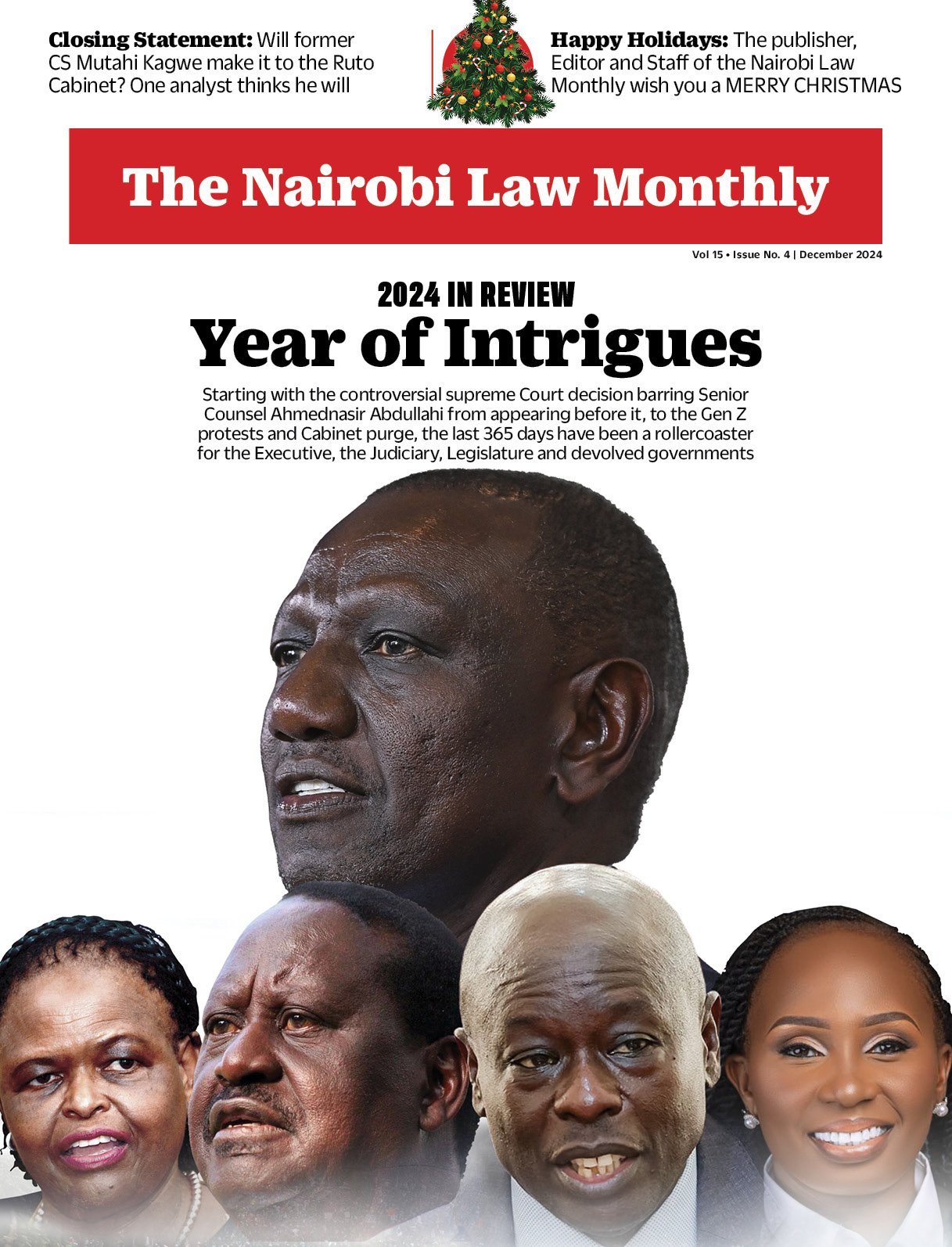These are extraordinary times, but human rights law still applies
BY NDUNG’U WAINAINA
It seems the majority of Kenyans are yet to internalize the impact of Covid-19. It is not just another humanitarian crisis. There is not a ‘normal’ to go back to. Covid-19 will cause serious disruptions to the social, economic, political, cultural, security, and financial systems of the world. Demagoguery and old school politics are going to collapse under the heavy COVID-19 earthquake.
The coronavirus pandemic seems to be the straw that breaks the camel’s back of economic and financial globalization. Global supply chains will drastically change economically and politically, as will politics within and between states.
The deadly and devastating nature of the coronavirus demands a comprehensive whole-of-government and whole-of-society response strategy that addresses short and long term challenges including factoring in the implications for gender differences and social expectations.
The strategy will be a pivotal and foundational basis in developing efficient informed collaborative partnerships between government, and private and social sectors, and international cooperation. A pandemic of this nature cannot be responded to through measures that are informed by the dictates of impulse, chance, and luck. When the government has a publicly known plan that people can understand, they can start making their own plans to adapt and support it.
The ideal Covid-19 response strategy requires war-like mobilization of resources and efficient delivery in government practice. The government needs a coherent plan that must adjust both health policies and macroeconomic policies to urgently boost health work and the health system’s capacity to meet what may be an overwhelming COVID-19 response demand for a sustained period.
Review, re-prioritize budgets
National and county governments should immediately prepare and present a supplementary budget that reviews, re-prioritize and reallocate capital and recurrent expenditures in the 2019/20 budget to increase spending on public health systems and medical supplies and provide lifeline relief to families, individuals, and small businesses to retain jobs. Further, the government should proceed and borrow as set out in the budget but use the funds to create a support base to prevent the economy from sinking completely. In addition, the government should seek debt relief and rescheduling of payment of loans and utilize those resources in addressing both health and economics.
Expansionary macroeconomic policy may not do much to increase production and employment when the country has a near economic shutdown and people are obliged to stay at home. Jointly, national and county governments and legislatures must enact policies and laws that offer targeted reliefs including moratoriums and life relief funds to the Kenyan households especially on rent, food, medical care, loans repayments etc., and for small businesses to remain afloat and keep workers’ jobs. While Kenyans have once again demonstrated their charity generosity by caring for fellow citizens, this is unsustainable. The state cannot abdicate its obligations to citizens and or prescribe private solutions to public problems.
Both county and national administrative and political states must ensure no supply chain disruptions for essentials like food, medical supplies, and healthcare services — especially those not related to COVID-19). It is vital to retain the production of essential supplies for domestic consumers.
It is now clear that the faster all cases are found, tested, and isolated, the easier we will curb the virus. This systematic action will save lives and mitigate the economic impact of the pandemic. This is a collective effort for all Kenyans but the government must lead from the front with evidence, data and expert modeling to inform decision-making processes.
In order to tackle COVID-19 preventive and health services measures, the Health ministry and County governments’ health departments must be provided with all the resources and capacity necessary for rigorous mass testing, contact tracing, clustering, quarantining, isolation and cases management. This is the quickest, surest, and guaranteed roadmap to reopening of the social and economic activities of the country. The resurgence of new cases in countries that had initially managed to stop the spread is a stark warning not to gamble with it.
It is vital that Kenyans are told with all honesty the country’s capacity to do massive testing for both symptomatic and symptomatic cases. The country will not successfully tame spread if it does so blindly without ramping up testing. It is important to have decentralized testing capacity under the supervision of the COVID-19 national reference laboratory. Options to engage and partner with private laboratory services and research institutions should be considered.
Health workers are the frontline professionals in containment and delay of COVID-19 spread. Both county and national governments must do everything to support health workers who, despite their own well-founded fears, are stepping directly into the path of Covid-19 to do what they can to halt the virus’s spread. They must be provided with information, resources, and support they need including medical equipment, personal protective equipment, and healthcare systems. Health workers must be paid promptly, be given reliefs and facilitated in every way. The response must ensure there are plans to deal with their long-term physical and mental health implications. The country should not let its frontline soldiers become patients.
The spread of the coronavirus has reminded us of the darker side of “security-forward” epidemic control responses. It is clear that epidemics of this magnitude require a dedicated response but people must be clear which ones actually move the needle. Rulers are using the Covid-19 pandemic as an excuse to grab more power, including suspending parliaments and turning themselves into law makers. Courts are being shut down and the public is going along with it. Rulers have seen an opportunity to abuse power and engage in monkey business while purporting to act in public interest — by not ‘letting a good crisis go to waste’. We must not let them.
The scale and severity of the COVID-19 pandemic clearly rises to the level of a public health threat that could justify restrictions on certain rights, such as those that result from the imposition of quarantine or isolation limiting freedom of movement. At the same time, careful attention should be to human rights principles especially respect for human dignity to foster an effective response amidst the turmoil and disruption and limit the harms that can come from the imposition of overly broad measures. Openness and transparency underpin many fundamental rights and freedoms necessary to an effective COVID-19 response.
When the British Parliament sought broad new power to conduct surveillance and control people to fight the coronavirus, MPs insisted that these powers would be used responsibly and specifically for public health matters only. It took only one weekend for a police department in Derbyshire to show exactly why citizens should not trust government officials. Parliament passed a law forcing citizens to shelter in place, restrict their movement, and close down non-essential businesses and commerce, the law is full of exceptions.
For Brazilian President Jair Bolsonaro, politics comes before truth. Since the beginning of the pandemic, he has been disseminating doubts on social media to galvanize his radical supporters while creating a distraction for his government’s inability to implement social and economic aid to the low-income families affected by social distancing. Bolsonaro has used chaos as a method to preserve the fidelity of his voters. His political ideology, Bolsonarism, is based on a permanent challenge to the institutions.
Democracies trump dictatorships
Comparatively, Asian countries that mounted a relatively effective defense against the coronavirus like South Korea, Taiwan, Hong Kong, and Singapore are boisterous democracies that acted transparently as they restricted travel, organized aggressive testing, and imposed strict quarantines. These examples are exactly why people resist government authority, even in times of great crisis.
The pandemic is far from over, and there are many factors other than governing style. Constitutional lawyer, Wachira Maina, has written that managing pandemic is a governance issue. A country’s wealth and resources obviously play a major role in its ability to respond to an unexpected crisis, and countries with a history of previous epidemics have a clear advantage in coping with new ones. Transparency was one of the most important factors in the success of the Asian countries’ governments’ response to Covid-19. An analysis by The Economist of data from all epidemics since 1960 found that “for any given level of income, democracies appear to experience lower mortality rates for epidemic diseases than their non-democratic counterparts.” One reason, the magazine said, was that authoritarian regimes are “poorly suited to matters that require the free flow of information and open dialogue between citizens and rulers.”
The International Center for Policy and Conflict urges the government to show leadership in tackling the pandemic in a way that ensures that the use of digital technologies to track and monitor individuals and populations is carried out strictly in line with human rights. Technology can and should play an important role during this effort to save lives, such as to spread public health messages and increase access to health care. However, an increase in state digital surveillance powers, such as obtaining access to mobile phone location data, threatens privacy, freedom of expression, and freedom of association, in ways that could undermine the effectiveness of any public health response.
These are extraordinary times, but human rights law still applies. Indeed, the human rights framework is designed to ensure that different rights can be carefully balanced to protect individuals and wider societies. States cannot simply disregard rights. On the contrary, protecting human rights also promotes public health. Now more than ever, governments must rigorously ensure that any restrictions to these rights are in line with long-established human rights safeguards. Covid-19 offers an opportunity to demonstrate our shared humanity. The decisions that the government makes now to confront the pandemic will shape the country’s future. (
The writer is Executive Director, International Center for Policy and Conflict, @NdunguWainaina


